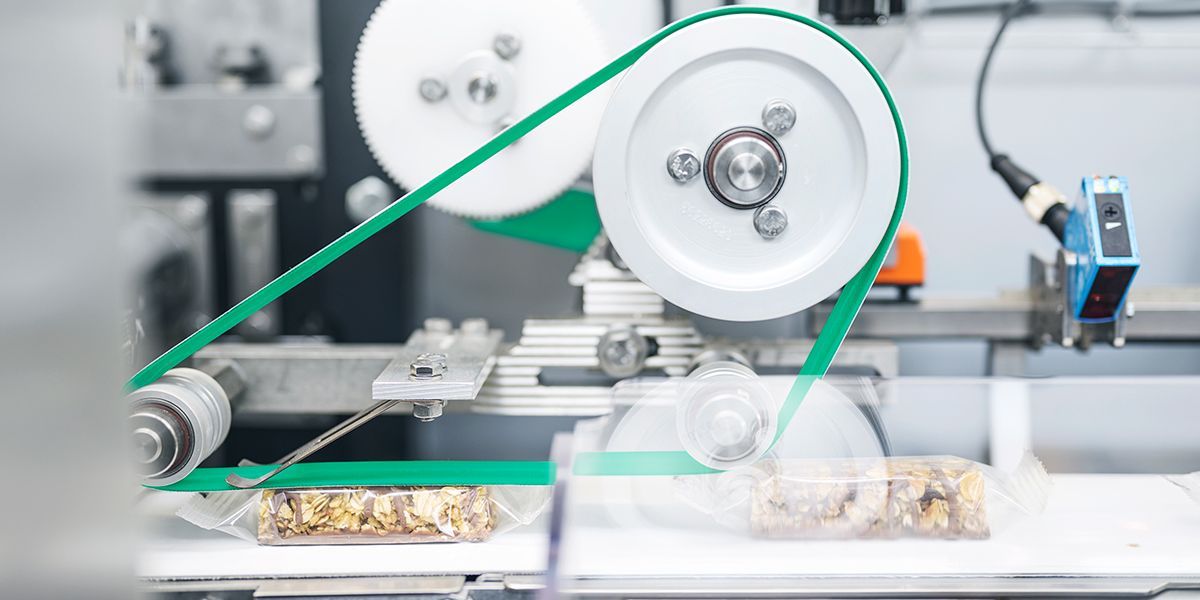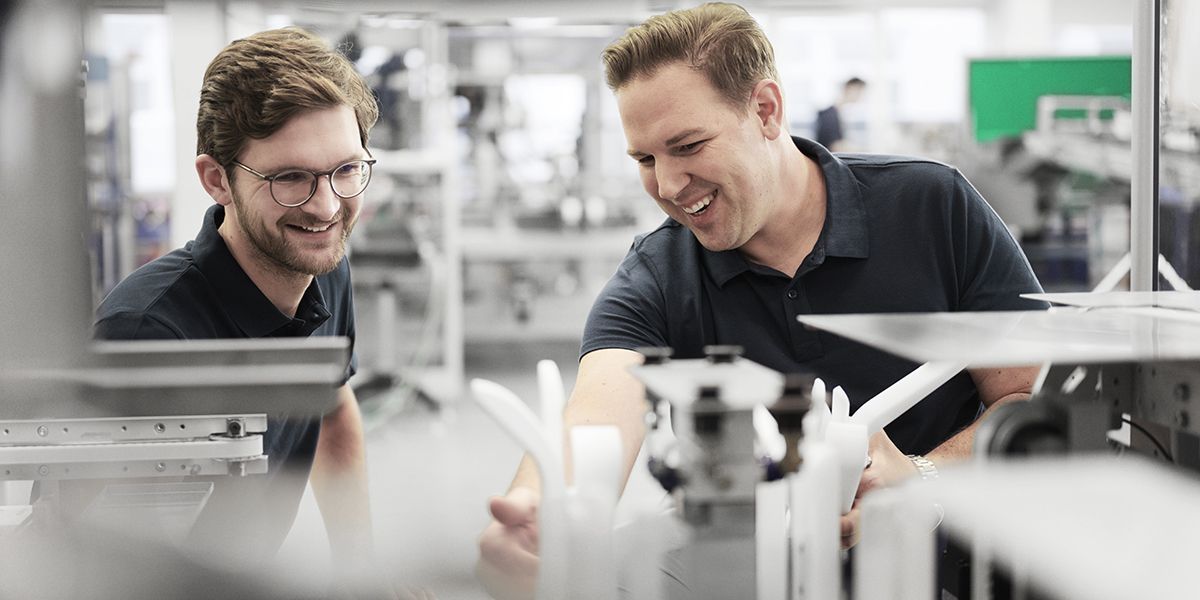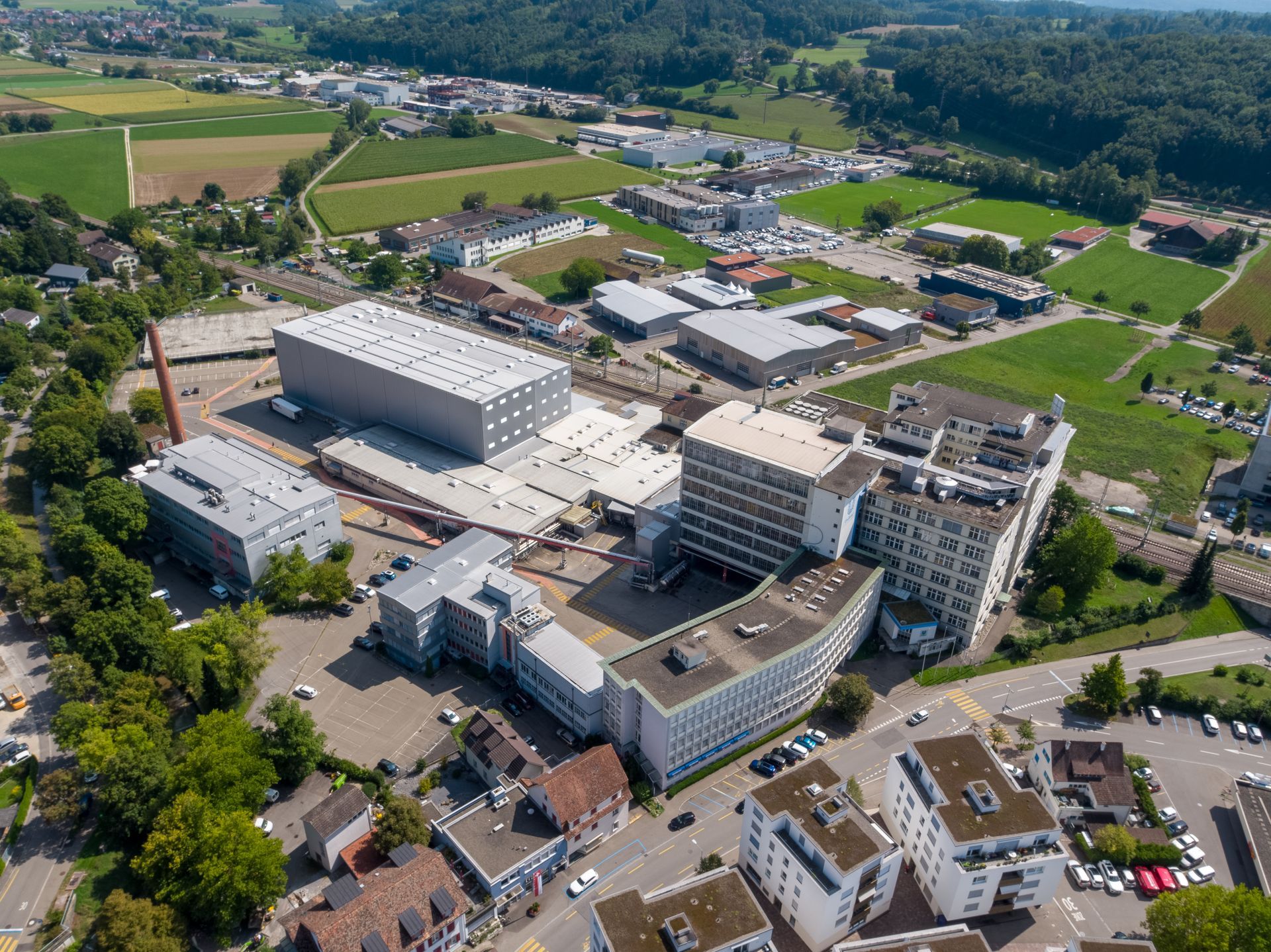Not only does packaging make products last longer, but it is becoming increasingly environmentally friendly. How does the Schaffhausen packaging cluster contribute to sustainability? Two Schaffhausen companies, SIG and Syntegon, share insights into their innovations.
Sustainability has boomed in recent years. In advertisements, website, even the annual reports of major firms – everywhere you look, people are emphasizing how environmentally friendly, fair, or organic their products and their purchases are. And the COVID pandemic has given an additional boost towards consuming local and regional products. Awareness of sustainability and a shift toward a resource-conserving lifestyle have reached the heart of society. Sustainability stands for a modern lifestyle that is not just an act of responsibility, but also can be fun.The German Zukunftsinstitut sees “neo-ecology» as an important and defining megatrend of the 2020s. They conclude: “Environmental awareness is turning from an individual lifestyle into a social movement. Sustainability from a consumer trend to an economic factor.” However, as our hunger for consumption continues unabated, companies must reduce resource consumption with innovative solutions and new materials. This in turn opens up new business opportunities.
«Environmental awareness and sustainability are turning from a consumer trend into an economic factor.»
German Future Institute
Consulting firm Deloitte is also convinced of this. A sustainable transformation is the basis for future growth, writes the Big 4 company's sustainability team. Strengthening the brand, upgrading the product range and developing new business models with sustainability features could prove to be attractive drivers of sales and profit. This is promising news for the future, especially for Schaffhausen-based companies in the materials technology sector.
«Sustainability has gained enormously in importance for our customers.»
Ingo Büttgen, SIG Combibloc
Customers want sustainable packaging
The packaging companies in Schaffhausen are already working intensively on sustainable solutions, particularly beverage carton manufacturer SIG Combibloc, whose roots and international headquarters are in Neuhausen am Rheinfall, and the packaging specialist Syntegon, which has a large and strategically important branch in Beringen, where it develops and produces packaging machines for the entire world. SIG Combibloc and Syntegon are the largest and best-known representatives of the Schaffhausen packaging cluster. This cluster consists of numerous companies that are active along the entire value chain – from production to research and development to consulting and analysis. An economic ecosystem that encompasses the Schaffhausen materials technology sector also includes Georg Fischer and the numerous mold makers in the region.
"The topic of sustainability has become hugely important for practically all of our customers," says Ingo Büttgen, Head of Corporate Communication at SIG. "When we sit down with customers today, it's usually the first item on the agenda that we discuss." This is not surprising. The environmental friendliness of packaging is becoming increasingly important. A study of consumers conducted by the global strategy and marketing consultancy Simon-Kucher & Partners in March 2021 showed that three-quarters of those surveyed value sustainable packaging. No wonder - the reputation of packaging is not the best. Once it has fulfilled its primary purpose of protecting the product, packaging quickly becomes waste, according to popular opinion.
Yet packaging is much more than just waste and can be a very sustainable product. "Packaging protects the contents from being damaged or broken," says Dr. Christian Bauer, Manager of Environmental Affairs and Product Related Sustainability at SIG. Medicines and many foods spoil quickly if they are not stored and transported in sophisticated, modern packaging. Other products, such as chemical materials or paints, cannot even be stored safely without suitable packaging. Medical technology products and surgical instruments must be stored in sterile environments to be safe for use. Finally, packaging fulfills an important marketing function and is often a decisive factor in a consumer's purchasing decision.
«Every product that we package has its own requirements.»
Christoph Langohr, Syntegon
Paper not necessarily greener than plastic
"The requirements vary depending on the product, which is why there is no 'one' right way to achieve greater sustainability," says Christoph Langohr, project manager for sustainable packaging at Syntegon's Beringen site. "We started looking closely at sustainable packaging solutions at an early stage," says Langohr. The first trials were launched and prototypes developed in Beringen a few years ago. When the first customers knocked on Syntegon's door and asked for more sustainable packaging, the team was already able to demonstrate possible solutions. "We carried out one of the first series of tests together with our customer Mondelez," recalls Langohr. Mondelez is one of the largest consumer goods producers in the world. This involved packaging chocolate bars in paper - one of three options for sustainable packaging materials that are the focus at the Beringen site.
«The most sustainable material is the one that can be saved.»
Christoph Langohr, Syntegon
Due to the different requirements placed on the packaging material, Syntegon uses monomaterial and bioplastics in addition to paper. In contrast to conventional composite materials, the individual layers of monomaterial are all made of the same type of plastic. This monomaterial can be recycled and returned to the plastic cycle. Bioplastics, on the other hand, are either biodegradable, made from renewable resources or a combination of both. Barrier papers, for example, are made from renewable wood fibers and can be disposed of normally in waste paper and thus recycled. «Every type of packaging has its pros and cons»,emphasizes Langohr. One cannot say that paper is generally better than plastic - or vice versa. On the one hand, the CO2 footprint is difficult to compare, as the calculation is very complex and depends on the environmental standards of the respective paper producers. Secondly, the requirements for packaging vary from region to region and also influence the sustainability of packaging. For example, the local climatic conditions or existing recycling systems in the region must be taken into account when selecting the packaging material. «Ultimately, the packaging should have as little impact on the environment as possible - and not just be greenwashing.» According to Langohr, the most sustainable material is, of course, the one that is saved from the outset. This is why the movement towards ever-thinner films and precise packaging has been noticeable for years. This saves a large amount of plastic - and therefore also costs, both to the consumer and the environment.
However, it is not only important that the packaging material becomes thinner and more ecological. The production processes themselves must be economically sustainable. For this reason, Syntegon attaches great importance to the convertibility of existing machines during product development. This allows customers to switch their production to paper at any time. «Another factor is the performance of the machines,» says Langohr. «If the machine only packs a fraction of the usual quantity in the same time after the conversion, the solution is no longer economical and the hurdle to convert is too high.» This aspect is taken into account right from the start and is incorporated into the development process. The Syntegon machines therefore offer more options with the same output - and thus follow another trend: more flexibility in production.
Consumers are also challenged
Consumers also need to change their way of thinking. On the one hand, they must prioritize buying products with more sustainable packaging. On the other hand, they must return the packaging to the recycling cycle - in other words, by separating waste properly. «We can therefore all play a part in determining the journey in the area of sustainable packaging,» says Langohr.
This is also supported by Dr. Christian Bauer from SIG. «Ultimately, the end consumer decides which packaging they prefer,» he says. The global trend is clearly moving towards sustainable materials. «While the focus in Europe is on renewable materials and the reduction of plastic, for example, in developing markets it's more about recycling,» he says. Good progress has already been made in this area in Europe, for example, beverage cartons with a recycling rate of over 50 percent, explains Bauer. The majority of SIG cartons are made from cardboard, which is produced from the renewable plant-based raw material wood. «On average, that's 70 to 80 percent,» says Bauer. The wood for the carton packs comes entirely from FSC-certified sources. The aluminum foil used as an important barrier layer - which is what makes many foods shelf-stable in the carton - comes from a responsible supply chain. When it comes to plastics, the focus is increasingly on renewable polymers and 100% renewable energy is used in the production of beverage cartons, as Arnold Schuhwerk, Head of Category Polymers & Energy Global, responsible for energy procurement and polymer purchasing at SIG, explains.
«Packaging protects the contents from being damaged or broken.»
Dr. Christian Bauer, SIG Combibloc
Giving back more than is consumed
«Generally», so Bauer, «our cartons are already very sustainable and have a better CO2 footprint than packaging made of plastic, metal or glass with the same function.» This has to do with the low weight, for example, but above all with the renewable main material. In the future, SIG packaging should consist of 100 percent plant-based raw materials, says Schuhwerk. However, this will require further innovation, especially in the area of barrier materials, where aluminum foil still plays an important role for many foods. But that is not enough for SIG. «We want to design systems and products that give back to society and the environment more than they need - products that are 'net-positive'», emphasizes Bauer. That is why the company is pursuing «Way Beyond Good» a sustainability strategy that actively promotes this goal and builds on a responsible culture and sustainable innovation. The strategy comprises four fields of action «Forest», «Climate», «Resources», and «Food.»
Certified wood and renewable plastic
Initial successes have already been achieved. In Bangladesh, for example, SIG is using a special, greatly simplified version of its filling technology in a pilot project. This project packages food that cannot be sold or used after harvesting as nutritious meals and makes it available to schoolchildren as part of a social project. SIG was also the first player in its segment to be fully FSC-certified. «Our next goal is not only to cover the amount of wood we need for cardboard production exclusively with what grows back in sustainably managed forests, but also to create additional sustainable forest areas», explains Bauer. The renewable polymers also come from sustainable forestry. «Tall oil, which is a by-product of paper production, is further processed as a renewable raw material in conventional polymer production and can be traced as a plant-based, renewable plastic via a so-called mass balance system», says Schuhwerk.
This will then be used in the injection molding plant at SIG allCap in Neuhausen, for example. The proportion is to be gradually increased in the coming years so that the goal of completely renewable, forest-based packaging can soon be achieved. «However, we are also dependent on our suppliers,» emphasizes Schuhwerk. «It will probably take a few more years before we reach the level of availability we want,» says Bauer. However, thanks to a clear strategy with a focus on sustainability coupled with continuous innovation, SIG is confident that its packaging system will continue to make a significant contribution to the development of sustainable and highly efficient food supply chains in the future.
Syntegon and SIG - two flagship companies representing how the Schaffhausen materials technology sector is actively addressing the problems and solutions of our consumer society in a globally leading way. Schaffhausen is innovating to a more sustainable future. «Made in Schaffhausen».
Two stories from Schaffhausen
Syntegon - Retrofit kit for paper packaging
In order to meet the sustainability requirements of consumers, Mondelez asked Syntegon in Beringen for a recyclable tubular packaging for its chocolate bars. Within a year, a retrofit kit for paper packaging was developed for existing Syntegon flow-wrapping machines. The innovative system does not reduce the packaging speed compared to the previous plastic system.
Location: Industrial site, Beringen
Employees: 600
Area of expertise: Packaging machines and processes
Syntegon is a leading global supplier of process and packaging technology for the pharmaceutical and food industries. Syntegon Packaging Systems AG in Beringen was originally founded as Sigpack and subsequently belonged to the Bosch Group. Following the takeover of the packaging machinery business by a private equity company, it was renamed Syntegon in 2020. Syntegon has a total of around 6,000 employees at 30 locations worldwide. With 800 employees, Beringen is the company's second-largest site - and of great strategic importance. The site is also the headquarters for the food sector and the global competence center for horizontal flow-wrapping machines, secondary packaging and sustainable packaging solutions.

SIG - «Tethered Cap»
From 2024, caps on drinks cartons or bottles in the EU must be attached in such a way that they remain on the container even after opening. Instead of waiting, SIG allCap has already developed such a closure system. The product is called a «tethered cap». This means that the cap cannot be disposed of individually and can be returned to the recycling cycle with the rest of the packaging.
Location: SIG site, Neuhausen am Rheinfall
Employees: 205 (incl. SIG allCap)
Area of expertise: Beverage and food cartons and closure systems
Based in Neuhausen am Rheinfall, the packaging specialist SIG Combibloc is one of the world's leading companies in the field of aseptic packaging for beverages and liquid foods. The company produces more than 38 billion cartons a year. carton packs. SIG carton packs for iced tea, milk and tomato sauce can be found on the shelves of numerous wholesalers around the world. The company's global headquarters and SIG allCap are located in Neuhausen. The latter specializes in the development and injection moulding of caps (2020: 7.5 billion units) as well as the planning and development of the necessary production systems.








